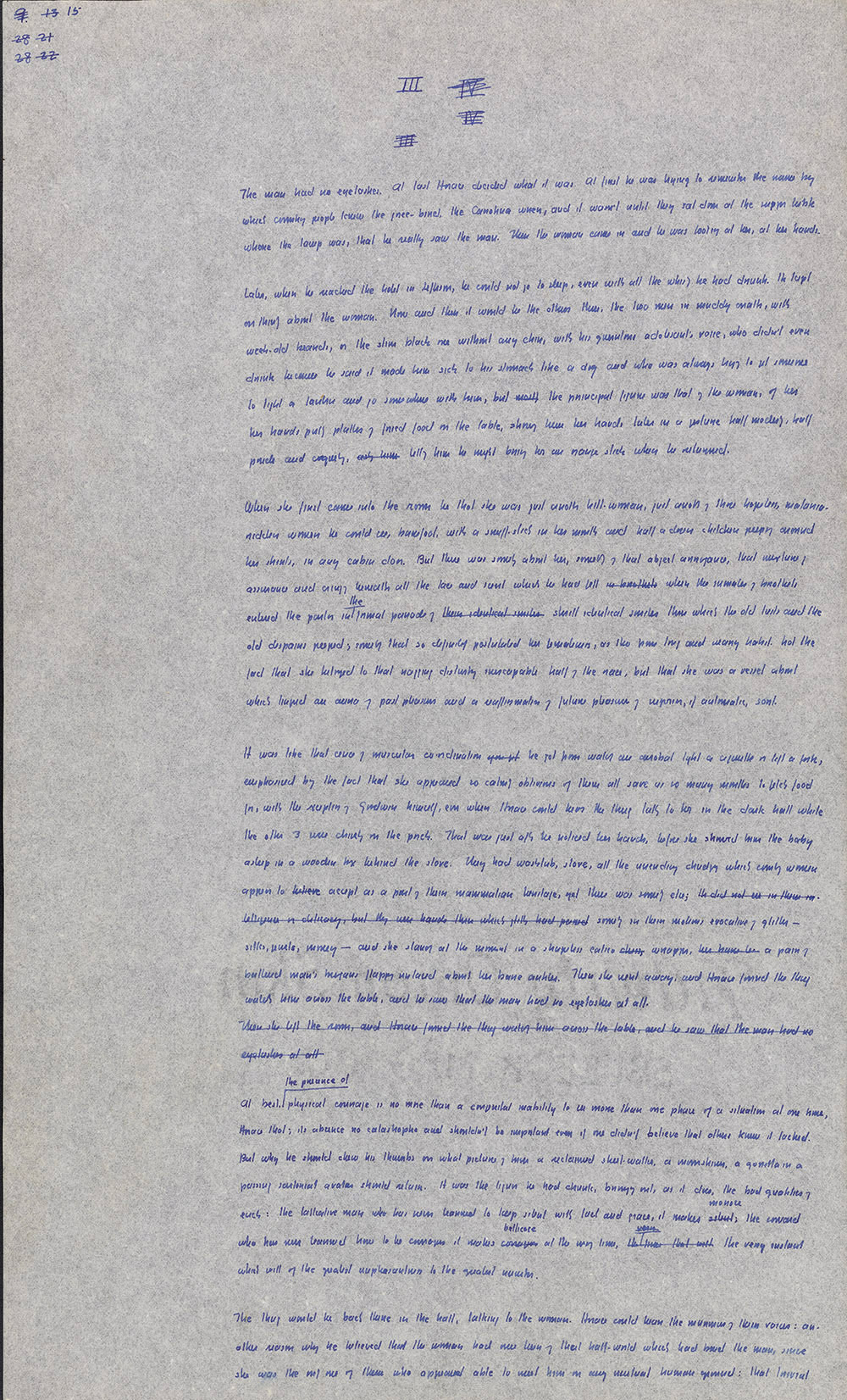TRANSCRIPTION
<III>
<IV>
III
<IV>
The man had no eyelashes. At last Horace decided what it was. At first he was trying to remember the name by
which country people knew the joree-bird, the Carolina wren, and it wasn't until they sat down at the supper table
where the lamp was, that he really saw the man. Then the woman came in and he was looking at her, and her hands.
Later, when he reached the hotel in Jefferson, he could not go to sleep, even with all the whisky he had drunk. He kept
on thinking about the woman. Now and then it would be the other three, the two men in muddy overalls, with
week-old beards, or the slim black one without any chin, with his querulous adolescent's voice, who didn't even
drink because he said it made him sick to his stomach like a dog and who was always trying to get someone
to light a lantern and go somewheres with him, but <[mostly?]> the principal figure was that of the woman, of her
her hands putting platters of fried food on the table, showing him her hands later in a gesture half modesty, half
pride and coquetry, <asking him> telling him he might bring her an orange stick when he returned.
When she first came into the room he thought she was just another hill-woman, just another of those hopeless, malaria-
ridden women he could see, barefoot, with a snuff-stick in her mouth and half a dozen children peeping around
her skirts, in any cabin door. But there was something about her, something of that abject arrogance, that mixture of
assurance and cringing beneath all the lace and scent which he had felt <in brothels> when the inmates of brothels
entered the parlor in the formal parade of <their identical smiles> shrill identical smiles through which the old lusts and the
old despair peeped; something that so definitely postulated her femaleness, as though from long and weary habit. Not the
fact that she belonged to that nagging disturbing inescapable half of the race, but that she was a vessel about
which lingered an aura of past pleasures and a reaffirmation of future pleases of superior, if automatic, sort.
It was like that sense of muscular co-ordination <you get> he got from watching an acrobat light a cigarette or lift a fork,
emphasized by the fact that she appeared so calmly oblivious of them all save as so many mouths to fetch food
for, with the exception of Goodwin himself, even when Horace could hear the thug talking to her in the dark hall while
the other 3 were drinking on the porch. That was just after he noticed her hands, before she showed him the baby
asleep in a wooden box behind the stove. They had washtub, stove, all the unending drudgery which country women
appear to <believe> accept as a part of their mammalian heritage, yet there was something else; <he did not see in their in-
telligence or delicacy, but they were hands through which [glittering?] had passed> something in their motions evocative of glitter –
silks, jewels, money – and she standing at the moment in a shapeless calico <dress> wrapper, <her [bare leg?]> a pair of
battered man's brogans flapping unlaced about her bare ankles. Then she went away, and Horace found the thug
watching him across the table, and he saw that the man had no eyelashes at all.
<Then she left the room, and Horace found the thug watching him across the table, and he saw that he man had no
eyelashes at all>
At best, the presence of physical courage is no more than a [congenital?] inability to see more than one phase of a situation at one time,
Horace thought; its absence no catastrophe and shouldn't be [repented?] even if one didn't believe that others knew it lacked.
But why he should chew his thumbs over what picture of [illegible] a reclaimed street-walker, a moonshiner, a gorilla in a
passing [sartorial?] avatar should return. It was the liquor he had drunk, bringing out, as it does, the bad qualities of
each: the talkative man who has never learned to keep silent with tact and grace, it makes <silent> morose; the coward
who has never learned how to be courageous it makes <courageous> bellicose at the wrong time, <the very time that with> the very instant
which will [illegible] the greatest unpleasantness to the greatest number.
The thug would be back there in the hall, talking to the woman. Horace could hear the murmurs of their voices: an-
other reason why he believed that the woman had once been of that half-world which had bred the man, since
she was the only one of them who appeared able to meet him on any mutual human ground: that trivial
|


